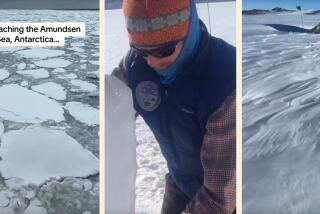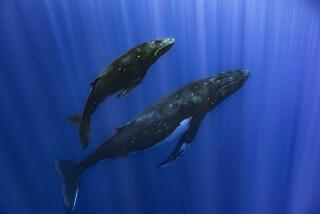STATE OF MIND : Sound and Fury
- Share via
For years, deep thinkers around the world have been coming up with theoretical models that attempt to explain and predict changes in global climatic conditions, and how man’s behavior affects them. Policy-makers, environmentalists and industrialists study the models, debating their implications and the regulations based upon them.
One problem: No one knows whether any of the major climate models are accurate because very little is known about how the oceans affect the atmosphere, and vice versa.
Walter Munk, 77, an oceanographer at the Scripps Institution of Oceanography, thought he could inject some hard data into the debate. What he got was a sea of grief.
Munk wanted to test the climate models by measuring the temperature of various spots in the Pacific Ocean. Knowing that water temperature is one factor that determines the speed with which sound waves travel in the ocean, he planned to broadcast low-freque ncy, 195-decibel waves from Hawaii and Monterey Bay to several receivers around the Pacific. At the end of his 10-year experiment, scientists would be able to determine which, if any, of the existing models is accurate and provide facts--not theories--upon which to base new or modified climatic models.
But once word of his plan hit the newspapers last year, a furor erupted. Nightmarish stories circulated that the sound waves would cause the ocean to be awash with deaf and dying whales and other sea life. The plan was delayed last May, pending further research.
But it turns out that 195 decibels underwater is only about as much noise “ as is made by a large cargo ship,” says Munk. “ We’re now hoping to get measurements starting in May. Munk will have two leading marine biologists who have long studied the effects of sound on mammals working with him on the project.
But many environmentalists still oppose the program. “ There aren’t going to be a lot of dead whales floating around,” says Lindy Weilgart, one of the two biologists who led the opposition to Munk’s experiment early on, “ but we don’t know what effect this experiment is going to have long term.” One of her concerns is that the sound waves could confuse the whales and other creatures that depend on sound for communication and navigation. But Munk strongly believes that no harm will come to sea life, noting that supertankers and other large vessels make many times more noise than his experiment.
His tests, he stresses, may play a pivotal role in climatic studies. “ We have no reason to believe that the current models are credible. Until they are tested against observations,” Munk says, “ they cannot serve as a basis for making very important policy decisions.”






